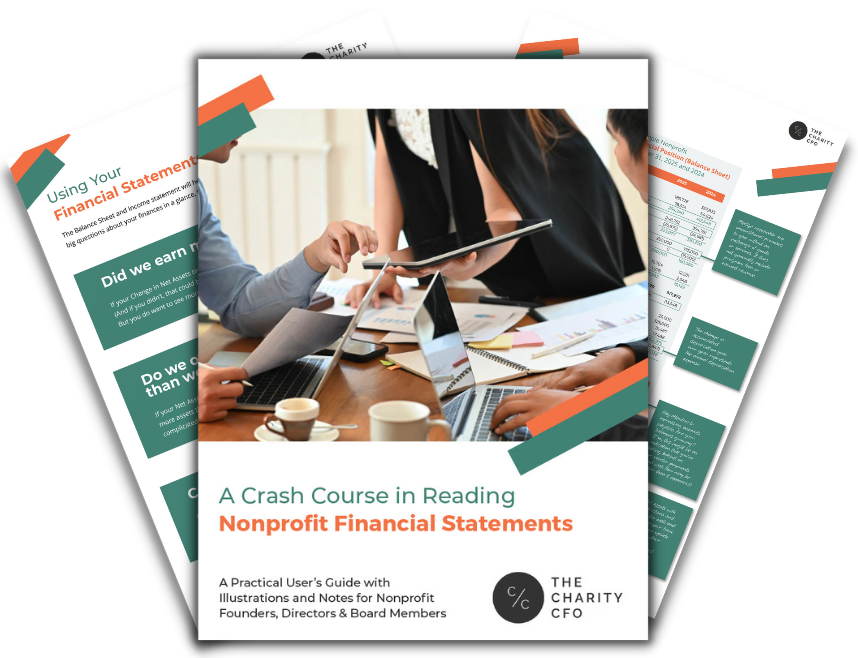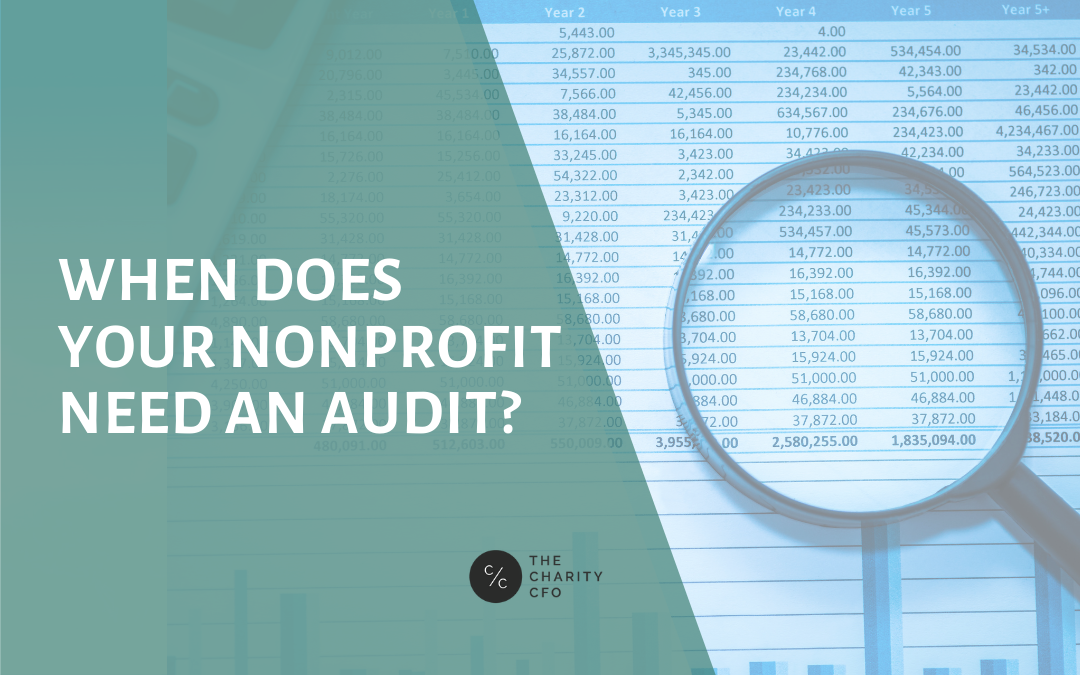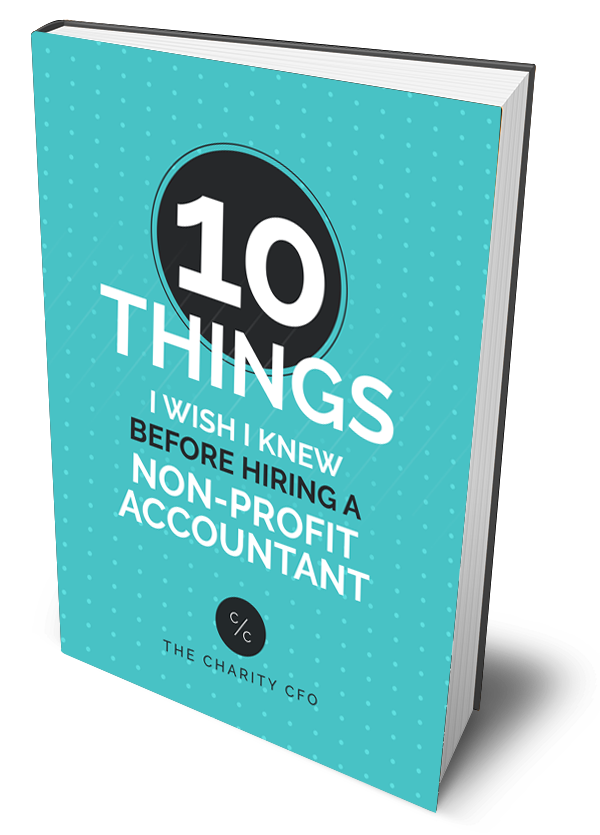Are you clear on the nonprofit audit requirements for your organization?
Contrary to what many people envision, a nonprofit audit doesn’t usually start with a letter from the IRS. Instead, an independent nonprofit audit is something you choose to build trust in your nonprofit organization.
In fact, the IRS doesn’t issue requirements for nonprofits to be audited, but other federal and state agencies do in some circumstances.
Plus, many grantmakers, foundations, lenders, and donors will require an independent audit before giving money to your nonprofit organization.
An audit can be a critical step for a growing nonprofit that needs to raise increasing amounts of funds. But it’s expensive. And time-consuming. So it’s not always a wise investment for some smaller nonprofits.

Do You Struggle to Make Sense of Your Financial Statements?
Get our FREE GUIDE to nonprofit financial reports, featuring illustrations, annotations, and insights to help you better understand your organization's finances.
Get the free guide!In this article, we’ll take a look at what an independent financial audit is and when your nonprofit might need one. And we’ll also look at your less-expensive alternatives for establishing financial credibility with your stakeholders.
What is a nonprofit financial audit?
A nonprofit financial audit is an independent examination of the accuracy of your accounting records, financial statements, and internal controls.
It confirms your compliance with federal grant management standards. And many federal and state agencies require audits, depending your organization’s fundraising, size, and spending.
(For example, 26 states require an audit before a nonprofit can earn charitable registration — necessary for in-state fundraising. And, the Office of Management and Budget requires an audit when a nonprofit spends more than $500,000 in federal funds in a year.)
When you pass the audit, you’ll receive a clean bill of health from your auditor and a professional opinion stating the accuracy and validity of your accounting records. It assures outside observers that “the organization’s financial records meet generally accepted accounting principles.”
Bottom line? An audit shows your organization is trustworthy, compliant, and well-managed.
And that inspires trust and confidence among potential funders, banks, and other potential partners.
What a nonprofit financial audit is NOT:
First, this isn’t the same as an IRS audit–it’s not an “I’m being audited!” situation.
Instead, it is a decision to take proactive ownership of your organization’s financial health, transparency, and validity by hiring a professional to examine your books.
It’s also not a compilation of your financial statements, your financial strategy, or a report of financial viability. Those are up to you and your in-house or outsourced accounting team.
What are the nonprofit audit requirements? And is your organization required to have one?
There are no hard-and-fast rules for when you need to conduct an audit. But here are some of the common external triggers that may require you to conduct an independent audit:
✔️ When you spend over $500,000 per year.
Nonprofits that spend $500,000 a year are typically required to do an annual audit (but this varies by state, so check your state’s requirements)
✔️ When it is in your bylaws.
Check your company’s founding documents. The founders may have stated the organization would complete annual audits.
✔️ When you receive federal funding.
Organizations that receive more than $750,000 in federal funding may be required to complete an audit.
✔️ When you want to get serious about grant funding.
Many grants require an audit (not a review or compilation) because it provides an opinion of assurance.
✔️ When you want to apply for a loan.
Many banks will ask for audited financials as a prerequisite for lending you money.
Some internal changes may also trigger an audit:
- Changes in services, programs, or leadership
- Acquiring, merging with, or losing a partner organization
- Shifting debt, leases, or contracts
The benefits of an independent financial audit for nonprofits:
No other report, review, or statement inspires more confidence than an audit. Which makes it easier for you to attract larger donations, apply for grant funds, and access lending facilities.
Because it’s a universal indicator that your organization takes fiscal responsibility seriously, it’s impact goes beyond fundraising. An audit is also a symbol to the media, volunteers, watchdog groups, and the community you serve.
Internally, it provides valuable oversight for your bookkeeper or accounting team. And it gives the board and leadership the peace of mind that your books are accurate and reliable.
All in all, a financial audit helps you hold your organization accountable to your mission, build trust with the outside world, and access money to pursue your goals.
Less expensive alternatives to a nonprofit audit:
Because a nonprofit audit can easily cost $10,000+, not every nonprofit can afford one.
If you need to build confidence but aren’t ready to invest in an audit, you have two main alternatives: a financial review and a financial compilation.
We’ll look at the differences between your three options here. But the primary difference between a financial review, a financial compilation, and an audit is the level of “assurance” they provide.
What is assurance?
Assurance is an opinion given by a CPA on the accuracy of an organization’s financial statements. It shows whether or not your accounting records are accurate per generally accepted accounting principles (GAAP), in the auditor’s professional judgment.
An audit provides reasonable assurance, a review offers limited assurance (but not a professional opinion), and a compilation offers zero assurance.
Nonprofit Audit Alternative #1: Financial Review
In a Financial Review, an independent auditor reviews your financial statements to determine if they’re consistent with generally accepted accounting principles (GAAP).
It offers limited assurance that no significant modifications need to be made. While it does evaluate the accuracy of financial records, no professional opinion is given on that accuracy. A financial review typically costs 40-60% less than an audit.
Despite the lower level of assurance, a financial review may be enough for some grantmakers to approve your organization. Even if a grant asks for audited financials, sometimes that isn’t a deal-breaker if you have a financial review and meet their other criteria.
But without at least a financial review, you’re probably out of luck when it comes to most grants.
Nonprofit Audit Alternative #2: Financial Compilation
A compilation simply organizes your financial records for a specific period in a GAAP-acceptable format without evaluating the accuracy of those records.
It’s a cost-effective option for organizations that need a GAAP report. But it offers zero assurance as to the accuracy of your books.
A compilation can help your nonprofit identify obvious errors by getting their books into an organized format. It adds primary value and serves owners, board members, creditors, and financial institutions. A compilation is your least expensive and time-consuming option.
Not sure if you meet the requirements for a nonprofit audit? We can help you figure that out.
The Charity CFO doesn’t conduct nonprofit audits. But we have 5 former nonprofit auditors on our team, so we know exactly how to prepare your organization to pass your audit the first time.
Even better, with our nonprofit bookkeeping and accounting services, we’ll ensure your books are always audit-ready. Plus, give you timely financial reports and expert advice that help you carry out your mission.
We’ll help clean up your books and implement state-of-the-art systems to save you time and bring your accounting department into the 21st century.
We’re honored that over 120 nonprofits trust us with their bookkeeping and accounting. And we’d be excited to show you how we can help your organization meet your goals.
Schedule a Free Consultation

Do You Struggle to Make Sense of Your Financial Statements?
Get our FREE GUIDE to nonprofit financial reports, featuring illustrations, annotations, and insights to help you better understand your organization's finances.
Get the free guide!





0 Comments